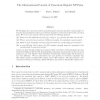Free Online Productivity Tools
i2Speak
i2Symbol
i2OCR
iTex2Img
iWeb2Print
iWeb2Shot
i2Type
iPdf2Split
iPdf2Merge
i2Bopomofo
i2Arabic
i2Style
i2Image
i2PDF
iLatex2Rtf
Sci2ools
COCOON
2007
Springer
2007
Springer
The Informational Content of Canonical Disjoint NP-Pairs
We investigate the connection between propositional proof systems and their canonical pairs. It is known that simulations between proof systems translate to reductions between their canonical pairs. We focus on the opposite direction and study the following questions. Q1: Where does the implication [can(f) ≤pp m can(g) ⇒ f ≤s g] hold, and where does it fail? Q2: Where can we find proof systems of different strengths, but equivalent canonical pairs? Q3: What do (non-)equivalent canonical pairs tell about the corresponding proof systems? Q4: Is every NP-pair (A, B), where A is NP-complete, strongly many-one equivalent to the canonical pair of some proof system? In short, we show that Q1 and Q2 can be answered with ‘everywhere’, which generalizes previous results by Pudl´ak and Beyersdorff. Regarding Q3, inequivalent canonical pairs tell that the proof systems are not “very similar”, while equivalent, P-inseparable canonical pairs tell that they are not “very differe...
| Added | 07 Jun 2010 |
| Updated | 07 Jun 2010 |
| Type | Conference |
| Year | 2007 |
| Where | COCOON |
| Authors | Christian Glaßer, Alan L. Selman, Liyu Zhang |
Comments (0)

